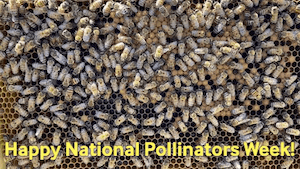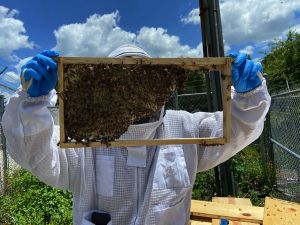Happy National Pollinators Week from UF/IFAS Extension Seminole County!
 What is a pollinator?
What is a pollinator?
A pollinator is something that moves pollen to help plants reproduce. A plant can produce a flower that attracts pollinators to help move pollen. The plant needs to have the pollen move from a male flower to a female flower. However, sometimes a flower can have both male and female parts. Flowers like this can still need the help of a pollinator to get the pollen from the male part to the female part.
When people think of pollinators, they often think about the honey bee, Apis mellifera. This is a very important pollinator throughout the world. Honey bees are so important that there are beekeepers found all around the globe, from hobbyists to professionals. Nonetheless, there are many other pollinators, and not just bees. Bats, birds, insects, and other creatures can also be important pollinators.
Why are pollinators important in agriculture?
More than 100 crops grown in the U.S. are dependent on pollinators. Some crops like blueberries are almost entirely dependent on bees for pollination in order to produce fruit. In Florida, our fruit and vegetable producers rely heavily on pollinators to produce many of our Fresh from Florida products.
Some of the top pollinators in agriculture are insects. Honey bees, native bees, butterflies, moths, wasps, flies, and others are all important pollinators to agriculture. Pollinators can increase the yield and quality of agricultural commodities. They are also essential to producing a lot of the foods we eat!

Our apiary
Here at UF/IFAS Extension Seminole County, we have an educational apiary that is a joint effort with the Seminole County Beekeepers Association (https://www.seminolecountybeekeepers.org/). Our hives are located right by the teaching garden which is maintained by our Master Gardeners. Our bees are busy pollinating our garden, building honeycomb and making some delicious honey!
We hope to offer some hands-on beekeeping courses in the future, so stay tuned for upcoming events!
More great resources on pollinators:
- A Guide to Planting Wildflower Enhancements in Florida (https://edis.ifas.ufl.edu/in1180)
- Attracting Native Bees to your Florida Landscape (https://edis.ifas.ufl.edu/in1255)
- Pesticide Labeling: Protection of Pollinators (https://edis.ifas.ufl.edu/pi271)
- Minimizing Honey Bee Exposure to Pesticides (https://edis.ifas.ufl.edu/in1027)
- The USDA Pollinators Page (https://www.usda.gov/pollinators)
 0
0
